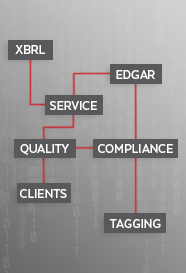Recently I sat down with a couple of our resident XBRL Account Managers to see what their thoughts were on the clients’ knowledge of XBRL and whether going in-house would make sense. Here’s what I found out:
Question: What would you say are the most challenging aspects of XBRL for clients to understand?
XBRL Account Manager: Bleed-through and negations would be top of the list. Explaining the context of specific tagging can also be difficult. Someone can look at the definition, and it could look appropriate on its face. However, the definition can sometimes be misleading, and you have to look at the structure of the taxonomy to see where the definition was pulled from to be certain it is appropriate. It can also be hard to explain what actually happens within the code. For example, a client who transitions over to us from tagging on their own with a software will negate an item, but it will not reflect in the code. The presentation link base and the calculation link base will not match. It is difficult to explain why it’s not rendering in the code.
Question: Are you ever surprised by the coding errors that need to be corrected from previous vendors? What are some of the most common errors that you find yourself having to fix?
XBRL Account Managers: We are never surprised per se because, unfortunately, errors are frequent. That said the most common errors we find are inappropriate tagging. For instance, inconsistent parent and child relationships.
Question: How much time do you devote to keeping abreast all new SEC regulations?
XBRL Account Managers: Anytime there is a taxonomy update or new FASB guidance, we make sure we are familiar with it, and we spend quite a bit of time going through the guidance. Additionally, we get updates from major accounting firms, AICPA, FASB, and XBRL-US about changes that are coming down the pipeline but that have not yet been adopted. XBRL-US does not just update its members on new regulations, but also about any changes to their best practices. We train our team at least once a week on various topics including accounting guidance and taxonomy updates. And as founding members of the XBRL-US Center for Data Quality, we are deeply involved in the establishment of best practices as well.
Question: If you were the CFO of a public company, would you hire someone internally to take care of the creation of XBRL exhibits for you? Why or why not? No.
XBRL Account Managers: Absolutely not. That hired person is only going to have a fraction of the experience of a dedicated XBRL expert. You would be depending on someone who does four filings per year as opposed to an RDG manager for example that averages about 80 filings per year. Now, to be honest, if I was a CFO of a large company with unlimited funds, and I wanted to hire someone internally who I could send to XBRL workshops and have them focus exclusively on XBRL — I would go that route. But it sure seems inefficient to have a full time employee to do only four filings a year. Unless they are exclusively committed to the company’s XBRL reporting, they simply won’t have time to keep abreast of all the guidance. It just makes more sense to outsource.
Question: Why shouldn’t a company just outsource this process overseas?
XBRL Account Managers: Security first and foremost. This is time sensitive and pre-public information that we are dealing with, and sending it overseas prior to filing seems an unnecessary risk. However, a lack of US GAAP knowledge would also be a significant concern. It is doubtful that any foreign 3rd party provider is going to be as familiar as necessary with the same accounting standards as your financial statements.
Question: What do you say to a company that says: “My financials don’t change much from quarter to quarter and I already have my XBRL files built, so why can’t I just carry this forward and tag future filings myself? Seems simple enough.”
XBRL Account Managers: If your financials are in one consistent form, it does make it a bit easier. However, while your financial statements may not change, accounting standards are always changing. The taxonomy is also constantly changing. If your tagging does not change to keep pace with changes to the accounting standards and taxonomy, you will be left behind. Even the FASB guidance changes every month and we are constantly adopting these changes. If you have the same tagging for even a two year period– I guarantee that your tagging will be obsolete because everything around it has changed.
Question: Do you think that the SEC will ask for XBRL to be audited in the future?
XBRL Account Managers: Perhaps. However, before this happens, the SEC will have to push for increased consistency and quality on the XBRL reports, and they will have to increase their enforcement mechanisms to achieve this. The SEC is certainly going in that direction as they have already started to invest in-line XBRL, which would make auditing the XBRL more plausible.
So now the question goes to you- would you feel most comfortable hiring someone internally or outsourcing?
Written by : Divya Patel- VP Business Development
If you have any questions or would like any further detail, please feel free to contact Stewart Walker – SVP, Director of Sales
(415) 643-6017



